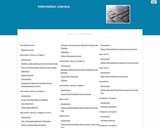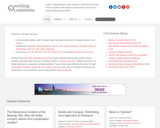
In this lesson, students learn to ask the right questions about the validity of surveys.
- Subject:
- English Language Arts
- Material Type:
- Activity/Lab
- Lesson Plan
- Provider:
- ReadWriteThink
- Provider Set:
- ReadWriteThink
- Date Added:
- 06/05/2024

In this lesson, students learn to ask the right questions about the validity of surveys.

There's no question that students will be able to compose good survey questions by the end of this lesson.

Students explore using electronic messaging and Internet abbreviations for specific purposes and examine the importance of using a more formal style of writing based on their audience.

Students examine books, selected from the American Library Association Challenged/Banned Books list, and write persuasive pieces expressing their views about what should be done with the books at their school.

This is an assessment from the Stanford History Education Group's Civic Online Reasoning curriculum. This is to assess how well students can assess information/claims that they find on social media. This is an assessment that is housed on Google Forms. You will be prompted to make a copy of the assessment which you can be distributed to students.

Students become familiar with the similarities and differences between electronic and printed text by comparing the textual aids included in a textbook with those of an educational website.

This lesson takes advantage of students' interest in music and audio sharing. Students investigate multiple perspectives in the music downloading debate and develop a persuasive argument for a classroom debate.

Students investigate how and why copyright law has changed over time, and apply this information to recent copyright issues, creating persuasive arguments based on the perspective of a particular group.

An Observation and Inquiry Sheet guides students as they analyze and compare their reactions to the value, engagement, and credibility of three websites related to Anne Frank and the Holocaust.

TIn this lesson we will be discussing with high school students how to protect themselves from fake news. We will be doing an activity that has them using these skills in real time.

To be information literate, a person must be able to recognize when information is needed and have the ability to locate, evaluate, and use effectively the needed information. By the end of this unit you will be able to Define Information Literacy, Define the four domains that fall under Metaliterate Learners, Identify a lack of knowledge in a subject area, Identify a search topic/question and define it using simple terminology, Articulate current knowledge on a topic, Recognize a need for information and data to achieve a specific end and define limits to the information need, and Manage time effectively to complete a search.

Today’s complex information landscape requires learners of all ages to take a second look at the news and media we consume. In this session, we will talk about how consuming information on a mobile device is different from a laptop (or television or newspaper) and everyday strategies to help students (and teachers) analyze and evaluate information.

Students explore naming conventions in digital and non-digital settings then choose and explain specific names and profiles to represent themselves online.

On this episode of UEN PDTV, Katie Blunt discusses with Utah State Board of Education curriculum specialists Robert Austin and Naomi Watkins about information literacy in the classroom. We learn from Utah teachers Charlotte Ducos and Williams Shields on how they are preparing students to navigate the vast wealth of information they are presented with every day and how to lead challenging, yet historically accurate, discussions in the classroom.

Students develop their reading, writing, research, and technology skills using graphic novels. As a final activity, students create their own graphic novels using comic software.

Writing Commons aspires to be a community for writers, a creative learning space for students in courses that require college-level writing, a creative, interactive space for teachers to share resources and pedagogy. Our primary goal is to provide the resources and community students need to improve their writing, particularly students enrolled in courses that require college-level writing. As mentioned in 'About Us', we believe learning materials should be free for all students and teachers part of the cultural commons. Hence, we provide free access to an award-winning, college textbook that was published by a major publisher and awarded the Distinguished Book Award by Computers and Composition: an International Journal.